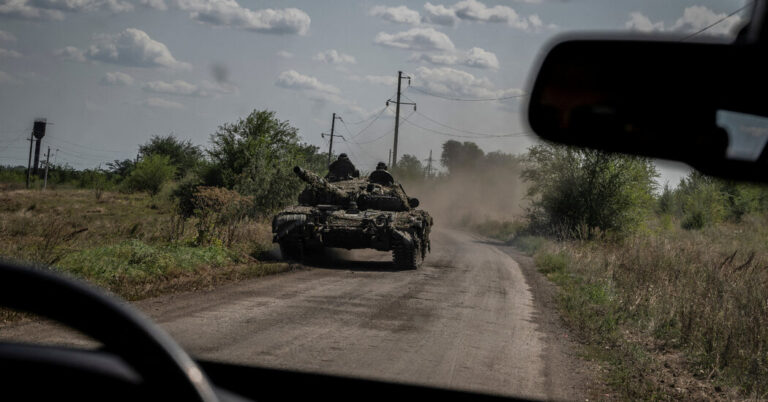Russia has recaptured land hard won by Ukrainian troops at the peak of their summer counteroffensive in the south, making progress around the southern village of Robotyne.
The situation has reinforced the war’s latest reality: With their counteroffensive stalled, Ukrainian troops are now on the back foot in many places. Besides Robotyne in the south, they are also struggling in the east, having all but retreated from the town of Marinka, officials said this week.
Deepening their challenges, Kyiv is increasingly worried that its military will not have the resources to keep up the fight. Washington announced on Wednesday that it was releasing the last remaining Congress-approved package of military aid available to Kyiv.
“Now, we are losing some fields, but if the U.S. aid is delayed, we will begin to lose towns,” Yehor Chernev, the deputy chairman of the Ukrainian Parliament’s committee on national security, defense and intelligence, said in an interview last week. “Without American ammunition, we are beginning to lose territory that was hard won this summer.”
For weeks, reluctance by Republican lawmakers in Congress to sustain assistance for Ukraine as the war stretches into another new year has thwarted Washington’s plans to send Kyiv more military aid. Congress declined again last week to pass a $50 billion security package for Ukraine, pushing back negotiations to next year.
Although some military aid could still flow from a separate program overseen by the Pentagon, the Biden administration is now tapping into the last remaining funds already approved by Congress. A $250 million package announced on Wednesday — which includes air defense equipment, artillery shells and over 15 million rounds of small arms ammunition — is likely the final tranche of available funding, according to American officials.
“When that one is done,” the National Security Council spokesman, John Kirby, told reporters last week, “we will have no more replenishment authority available to us.”
The situation around the village of Robotyne, in the southern Zaporizhzhia region, may be a case in point.
Western-trained and -equipped Ukrainian brigades retook the village in August after weeks of fighting. But the Institute for the Study of War, a Washington-based research group, said on Wednesday that Russian forces had now retaken positions captured by Ukraine during the counteroffensive, “likely after Ukrainian forces withdrew to more defensible positions near Robotyne for the winter.”
Russian troops have recently advanced from the southwest and east, pushing from Verbove, a nearby village that Ukrainian troops tried unsuccessfully to capture this summer to extend the bulge they had created in Russia’s defenses, according to the I.S.W. and open-source maps of the battlefield.
Russia’s advances have been limited so far: The open-source battlefield maps show that its forces have barely recaptured a few square miles of territory on the flanks of Robotyne. But Oleksandr Tarnavskyi, the head of Ukraine’s forces in the south, acknowledged to the BBC on Wednesday that “the situation in our sector is extremely difficult.”
Evgeny Balitsky, the Russian-appointed head of the part of the Zaporizhzhia region that Russia claimed to have annexed last year, told Russian television this week that he hoped Russian troops would soon retake Robotyne and reach the starting line of Ukraine’s counteroffensive.
That would be a significant morale blow to Ukraine.
Robotyne was one of the rare successes of the Ukrainian counteroffensive. Its capture after weeks of grueling fighting — far longer than the few days that the Ukrainian military leadership originally thought it would take — underlined the immense challenges Kyiv faced in punching through deep, dense Russian defenses.
With Ukraine’s troops exhausted by months of grueling fighting, Moscow is applying pressure all along the front line to reduce Kyiv’s ability to withdraw its units and replenish them for future offensives, said Jack Watling, a research fellow and specialist in land warfare at the Royal United Services Institute in Britain.
“The Russians are going to have the advantage through the next few months,” Mr. Watling said in a telephone interview this week. He added, however, that “they’re not going to be able to decide the conflict in the next few months” because of Moscow’s costly way of fighting, which entails accepting huge human and material losses for limited territorial gains.
Mr. Watling said that if Ukraine’s allies were to continue sending more weapons, the dynamics on the battlefield could be altered.
Mr. Chernev, the Ukrainian lawmaker, said, “Everything will depend on how quickly Congress votes on the aid package for Ukraine.”

